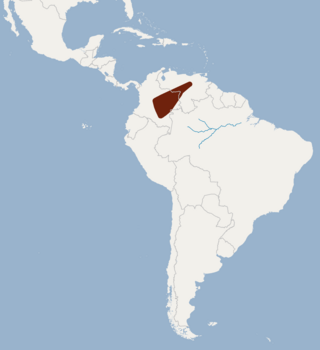
The New World leaf-nosed bats (Phyllostomidae) are found from southern North America to South America, specifically from the Southwest United States to northern Argentina. They are ecologically the most varied and diverse family within the order Chiroptera. Most species are insectivorous, but the phyllostomid bats include within their number true predatory species and frugivores. For example, the spectral bat, the largest bat in the Americas, eats vertebrate prey, including small, dove-sized birds. Members of this family have evolved to use food groups such as fruit, nectar, pollen, insects, frogs, other bats, and small vertebrates, and in the case of the vampire bats, even blood.

Tomes's sword-nosed bat, also known as the common sword-nosed bat is a bat species from South and Central America. It is also found in the Bahamas, but is known from only one specimen collected on the island of New Providence.

Marinkelle's sword-nosed bat is a bat species found in Colombia. In 2013, Bat Conservation International listed this species as one of the 35 species of its worldwide priority list of conservation. Its species name marinkellei was chosen to honor the Dutch scientist Cornelis Johannes Marinkelle, who worked in Colombia.

Lonchorhina is a genus of Central and South American bats in the family Phyllostomidae.

Fernandez's sword-nosed bat is a species of bat in the family Phyllostomidae. It is the smallest species of the Lonchorhina genus. It is endemic to Venezuela. In 2013, Bat Conservation International listed this species as one of the 35 species of its worldwide priority list of conservation. It is threatened by habitat loss. It derives its scientific name from a Venezuelan zoologist, Dr. Alberto Fernandez Badillo, whose research focused on vampire bats, in particular.

The Orinoco sword-nosed bat is a species of bat in the family Phyllostomidae. It is found in Colombia and Venezuela.

Phyllostominae is a subfamily of bats that include big-eared, spear-nosed, sword-nosed bats and relatives.
Bat Conservation International (BCI) is an international nongovernmental organization working to conserve bats and their habitats through conservation, education, and research efforts.

Campinarana, also called Rio Negro Campinarana, is a neotropical ecoregion in the Amazon biome of the north west of Brazil and the east of Colombia that contains vegetation adapted to extremely poor soil. It includes savanna, scrub and forest, and contains many endemic species of fauna and flora.







